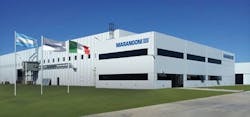Marangoni strengthens its presence in Argentina
Marangoni Retreading Systems, a division of Marangoni SpA, has opened a manufacturing plant in Alvear, Santa Fe, Argentina. The precure plant is the company's fifth worldwide to feature RingTread lines.
Marangoni Argentina S.A. has a market share of 30%, according to the parent company. It operates a network of 11 authorized RingTread dealers covering the entire country, as well as numerous other customers for the marketing of Unitread and Precauch strips and for business development in the Spanish-speaking countries of South America.
The opening of the factory, which replaces the previous smaller plant located in Rosario, "required important investments in terms of infrastructure and equipment," according to Marangoni.
"The objectives of the new plant in terms of productivity and quality include bringing an improvement in service while at the same time reaching a 20% growth in volumes over the next two years, in all Spanish-speaking South American countries."
Néstor Llaino,vice president of Marangoni Argentina, underlined the three main benefits that retreading can bring to the country during the inauguration of the new plant:
1. It extends casing life;
2. It results in lower mileage costs, thus keeping expenses down, "something that is extremely important in a country where 80% of transport is by road"; and
3. It helps protect the environment.
Since the early 1990s, the Llaino family, minority stakeholders in Marangoni Argentina, has been one of the drivers in the development of the rubber sector in Argentina.
Massimo De Alessandri, CEO of Marangoni SpA, said the opening represents “the third most important step made by the Marangoni Group in Latin America. "The first was the start of operations in Brazil, subsequently the partnership with the Llaino family, and now this new plant in Argentina."
The objective of the new plant is further growth in the Marangoni Group’s position in the Latin American retreading market. The company forecasts an initial production of 5,000 tons annually. Production will be increased over the years, with additional extensions to be made until production capacity is doubled.
